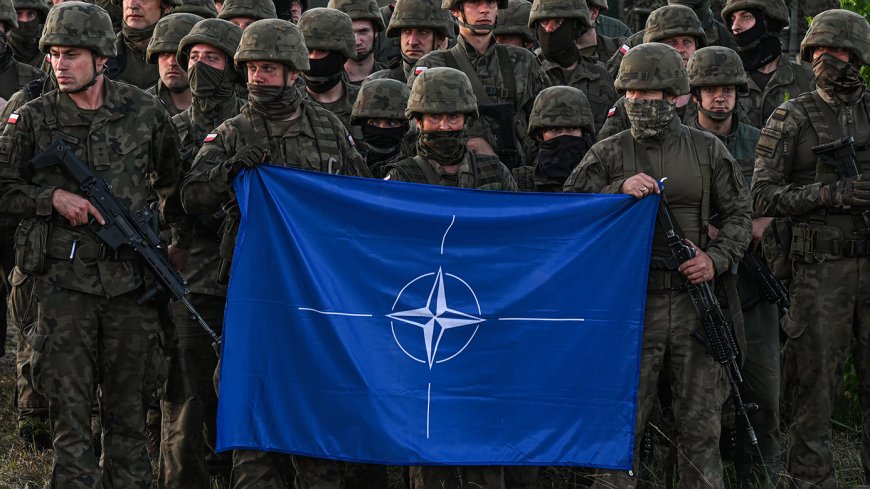Rethinking Transatlantic Ties: NATO in an Era of Strategic Drift
Since its inception in 1949 the North Atlantic Treaty Organization (NATO) has served as the bedrock of European security anchoring the transatlantic alliance in a shared commitment to collective defense. Yet as the geopolitical priorities of the United States shift in the 21st century cracks in this once-ironclad partnership are becoming increasingly visible.

By: A. Mahdavi
Since its inception in 1949 the North Atlantic Treaty Organization (NATO) has served as the bedrock of European security anchoring the transatlantic alliance in a shared commitment to collective defense. Yet as the geopolitical priorities of the United States shift in the 21st century cracks in this once-ironclad partnership are becoming increasingly visible.
The Trump administration’s confrontational approach to NATO characterized by demands for unprecedented financial contributions from European allies has exacerbated underlying tensions and raises fundamental questions about the future of this alliance.
Historically NATO embodied the principles of mutual benefit and strategic interdependence. The United States with its unparalleled military and economic power bore the lion’s share of NATO’s financial and operational burden during the Cold War. In return Washington gained a dominant role in European security and a platform to project power on the global stage. This symbiotic relationship ensured collective stability and successfully countered the Soviet Union's influence in Europe for decades. However, the post-Cold War era has seen a divergence in strategic priorities with Europe focused on regional security while the United States pivots toward addressing challenges in the Indo-Pacific and the rise of China.
The Trump administration’s foreign policy agenda--encapsulated in its “America First” doctrine--marked a decisive break from the postwar consensus that underpinned NATO’s unity. Skepticism toward multilateral institutions coupled with a transactional approach to alliances has led to calls for NATO member states to drastically increase their defense spending. The demand for members to allocate 5% of their GDP to defense far exceeding the long-standing 2% benchmark reflects a fundamental shift in Washington’s expectations. Frustrated by what it perceives as European overreliance on American military support the United States is signaling that its commitment to Europe’s security is no longer unconditional. The implication is clear: Europe must shoulder a greater share of the financial and operational burden or risk losing its most crucial security guarantor.
For Europe this new reality is both sobering and destabilizing. The prospect of reduced American involvement compels European nations to confront the daunting challenge of achieving “strategic autonomy” while managing persistent threats. The ongoing war in Ukraine and instability in the Middle East underscore the enduring relevance of NATO’s collective security framework. Yet without American military capabilities--particularly in intelligence logistics and advanced weapons systems--Europe’s ability to address these threats remains severely constrained. The divergence between European nations on how to adapt to this predicament only compounds the challenge. While countries like France and Germany advocate for a more independent European defense strategy nations closer to Russia’s borders such as Poland and the Baltic states remain deeply reliant on Washington's security guarantees.
The Trump administration’s fiscal demands also highlight the economic dilemmas facing European leaders. Meeting a 5% GDP defense spending target would necessitate substantial increases in military budgets likely at the expense of domestic priorities such as healthcare and social welfare. Convincing European publics--who increasingly perceive NATO’s demands as advancing American interests rather than their own--to accept such sacrifices will require deft political leadership and a compelling strategic vision.
Critically the United States’ recalibration of its global priorities does not merely challenge NATO’s operational cohesion it signals a deeper shift in the global order. As Washington turns its gaze toward the Indo-Pacific Europe must grapple with the implications of a diminished transatlantic partnership. The days of unquestioned American leadership in NATO appear numbered and Europe must chart a path toward greater self-reliance without forsaking the cooperative spirit that has long defined the alliance.
This moment of reckoning for NATO is as much about identity as it is about strategy. For the United States the question is whether disengagement from Europe in favor of Asia-Pacific priorities risks undermining the global stability it seeks to uphold. For Europe the challenge lies in reconciling its aspiration for strategic autonomy with the enduring need for collective defense. The transatlantic alliance once a cornerstone of global security now stands at a crossroads its future uncertain and its unity tested.
Ultimately NATO’s survival will depend on its ability to adapt to these tectonic shifts in the geopolitical landscape. Europe must recognize that it can no longer rely on American largesse and must assume greater responsibility for its own security. At the same time the United States must carefully consider the long-term consequences of alienating its European allies. Only through mutual accommodation and a renewed commitment to shared values can NATO hope to navigate this era of strategic drift and preserve its relevance in an increasingly fragmented world.













































